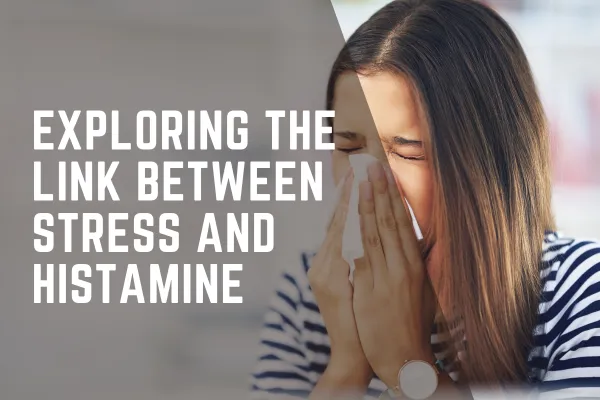
Exploring the Link Between Stress and Histamine
Stress and Histamine: The Link Explained
Stress, a normal response to everyday challenges, can affect our bodies in various ways. One lesser-known connection is the link between stress and histamine levels in the body. Histamine, a chemical involved in immune responses, can have a significant impact on our health when imbalanced. In this blog, we will explore the role of it in the body, the symptoms of imbalance, and the connection between stress and histamine. We will also dive deeper into the health issues associated with an imbalance, the drawbacks of antihistamines, and strategies to effectively reduce the Total Stressor Load. By understanding this complex relationship, we can take proactive steps to improve our overall health and well-being.

Understanding Histamine: What is it?
Histamine is a naturally occurring chemical produced by immune cells called mast cells. Its primary function is to regulate gut health, activate immune responses, and act as a neurotransmitter. It can be found throughout the body, including the skin, lungs, gastrointestinal tract, and nervous system. When our levels are balanced, it plays a vital role in maintaining the body's homeostasis. However, excessive levels can lead to chronic inflammation and a range of symptoms associated with histamine intolerance.
The Role of Histamine in the Body
Histamine plays a crucial role in the body's immune response. When the immune system detects a threat, such as allergens or pathogens, mast cells release it as part of the immune reaction. It acts as a chemical messenger, signaling other immune cells to initiate a response to neutralize the threat. This immune response helps to protect the body from harmful substances and infections.
Apart from its role in immune response, it also plays a role in gut health and neurotransmitter function. It acts as a neurotransmitter, sending signals between nerve cells to regulate various bodily functions. Additionally, it regulates the production of stomach acid, aiding in the digestion of food.
However, when our levels become imbalanced, it can lead to chronic inflammation and various symptoms associated with histamine intolerance. Excess levels can cause symptoms such as hives, headaches, digestive issues, and allergic responses. Understanding the role of it in the body is essential to grasp the connection between stress and histamine levels.
Key Symptoms of Histamine Imbalance
Histamine intolerance occurs when there is an imbalance between production and breakdown in the body. This can result from various factors, including genetic predisposition, underlying infection, nutritional deficiencies, and Total Stressor Load. The symptoms of histamine intolerance can vary widely from person to person and may include:
Hives, skin rashes, or itchiness: Excessive levels can cause allergic responses in the skin, leading to symptoms like hives, redness, or itchiness.
Digestive issues: It can affect gut health and may cause symptoms such as bloating, abdominal pain, diarrhea, acidic stool, or constipation.
Allergic responses: Histamine intolerance can mimic allergies, causing symptoms like nasal congestion, sneezing, watery eyes, or itching.
Headaches and migraines: It can trigger headaches and migraines in individuals with a high Total Stressor Load
Mood swings or irritability: Imbalanced levels can impact neurotransmitter function and contribute to mood swings, irritability, or anxiety.
Histamine intolerance can significantly affect a person's quality of life, leading to chronic symptoms and discomfort. Identifying and addressing the underlying issues contributing to the condition is crucial for long-term well-being.

The Connection between Stress and Histamine
Stress can impact various physiological processes in the body, including histamine levels. When we experience stress, our nervous system activates the "fight-or-flight" response, triggering a cascade of hormonal and neurotransmitter changes. These changes can influence a release and affect our levels in the body. Understanding the connection between stress and histamine can help us better comprehend the underlying mechanisms of stress-related health issues and explore strategies to manage stress and histamine levels effectively.
Effects of Cortisol on Histamine Stress Reaction
When exposed to a stressor, our bodies release stress hormones, such as cortisol and adrenaline, to prepare for a perceived threat. These hormones can activate mast cells, triggering a release as part of the stress response.
The nervous system, which plays a significant role in self regulation, can also impact histamine levels. The chemical is part of a response to exposure to a stressor, leading to elevated levels in the bloodstream and related allergy like symptoms. Chronic high levels of strain with a high Total Stressor Load can disrupt the balance in the body, contributing to symptoms and chronic illnesses.
Apart from the physical effects, stress can also affect mental health and exacerbate symptoms associated with histamine intolerance. Chronic levels can contribute to anxiety disorders, which can be accompanied by increased histamine levels. The interplay between hormones, histamine, and mental health is complex, but it highlights the need to consider resilience strategies when addressing histamine-related health issues.

Can Stress Cause a Histamine Reaction?
Chronic stress, characterized by long-term exposure to stressful situations, can also play a role in histamine-related health issues. Prolonged strain can increase levels, leading to a chronic, painful symptoms. Chronic Total Stressor Load burden can also impact the gut, contributing to gastrointestinal symptoms as well as overall health as we are now aware of the gut-brain axis. Some stressors can even be hidden infections of the GI track or low stomach acids as a result of short-term tactics for relief. So, can stress can cause a histamine reaction? Yes, especially when the overall Total Stressor Load is high.
How does stress affect histamine levels in the body?
Stress triggers the release of histamine, a chemical that plays a role in the body's immune response and inflammation. This can lead to increased histamine levels, which may cause symptoms such as allergies, hives, and other histamine-related conditions.
Histamine-Related Health Issues: A Deeper Dive
Imbalances can contribute to a range of health issues beyond the symptoms of Histamine Intolerance. Understanding these connections can shed light on the implications for our overall health and well-being.
Histamine Intolerance and Anxiety
Anxiety disorders can be accompanied by symptoms of histamine intolerance, suggesting a potential connection between our levels and anxiety. It can influence neurotransmitter function, including serotonin levels, which plays a crucial role in mood regulation. Imbalanced levels can disrupt neurotransmitter balance, contributing to symptoms of anxiety and heightened stress response. Understanding this potential relationship can provide insights into managing anxiety disorders and addressing histamine-related symptoms.

Understanding Insomnia in Relation to a Histamine Response to Stress
Insomnia, characterized by difficulty falling or staying asleep, can be connected to a an imbalance. It can act as a neurotransmitter that regulates sleep-wake cycles, among other functions. Imbalanced levels can disrupt this delicate balance, leading to difficulties in achieving restful sleep. According to Traditional Chinese Medicine, one of the most important timeframes is between 1:00am and 3:00am when the liver is said to be cleansing the blood. If you find yourself often waking during that window or right around 3:00am, that might be a sign that your levels are high and you need to work to reduce the Total Stressor Loa don your body to reduce insomnia symptoms.
Histamine Intolerance and Its Link to Mast Cell Activation Syndrome (MCAS)
Symptoms of an imbalance or intolerance is sometimes a sign that your mast cells are overactive due to an immune or stress response. Mast cell degranulation, a process where mast cells release it and other inflammatory substances, can be activated by any stressor or a high Total Stressor Load. The stress response, characterized by increased adrenaline release, can activate mast cells, leading to a release and subsequent symptoms related to MCAS. Understanding the mechanisms behind an imbalance can unlock the door to discovery of the root cause of the imbalances for individuals experiencing this distressing condition. Monique Lauria was able to successfully help her daughters and others resolve these issues at the root, healing is possible!

Why you might want to reconsider Antihistamines, even for allergies
Antihistamines are commonly used to alleviate symptoms associated with allergies and allergy-like reactions, such as hives. However, it is essential to reconsider the long-term use of antihistamines and their potential risks. They are designed for short term relief and are best coupled with a proactive long-term focus like the Pro Histamine Approach (click image below).

Is it safe for antihistamines to block histamine receptors?
Antihistamines work by blocking histamine receptors, preventing or reducing the symptoms caused by high levels in the body. By binding to the receptors, antihistamines suppress symptoms like itching, sneezing, and runny nose. These medications can provide temporary relief from related symptoms, however even when you take them your levels are still high and problems unresolved.
What are the risks of frequent or long-term antihistamine use?
Frequent or long-term use of antihistamines can have potential risks and side effects. Chronic inflammation can be worsened by prolonged inhibition of its release. Antihistamines can also affect immune cell function and gut health, potentially leading to imbalances in the gut microbiome. Moreover, some antihistamines can interfere with the organic cation transporter, affecting the absorption of other medications or nutrients. It is important to consider these potential risks and consult with a healthcare professional before relying on antihistamines as a long-term solution.
The Total Stressor Load: Understanding Your Body’s Communication
To effectively manage stress and histamine levels, it is crucial to understand the concept of the total stressor load – the cumulative effect of various stressors on our bodies. Viewing symptoms as forms of communication of clues from your body about what needs to be address turns you into your own wellness detective.
Identifying Triggers or Stressors adding to Inflammation
Identifying and addressing stressors can significantly reduce inflammation and the Total Stressor Load on our bodies. Common stressors can include chronic stress, environmental factors, lifestyle choices, and emotional stress. Keeping a journal to track stress levels and behavioral responses can help identify patterns and individual stressors. Additionally, addressing gut health, which can be influenced by stress, can contribute to reducing the overall stressor load on the body.

Click to learn more about the stressors adding to your Total Stressor Load
Recognizing the Signs of Overloading Stressors
Recognizing the signs of overloading stressors is essential for addressing stress-related health issues. These signs may include:
Increased immune response, such as frequent infections or allergic reactions.
Deterioration in mental health, like anxiety, depression, or mood swings.
Overreactive Nervous System, leading to startling easily, chronic fatigue, insomnia, or burnout.
Elevated cortisol levels, a stress hormone associated with long-term stress, can impact various bodily functions, affecting metabolism, immune response, and inflammation regulation.
By recognizing these signs, individuals can take proactive steps to reduce stressors and manage their overall stress levels effectively.
How Can You Effectively Reduce Your Stressor Load?
Reducing the stressor load on your body can significantly improve your stress response and histamine levels. Consider incorporating the following strategies into your lifestyle:
Low histamine diet: Reduce the load that your body and liver needs to process out by making conscious changes to your diet for short-term support during healing. This is not a key to long-term wellness, where the goal is to eat balanced foods that support your body.
Identify hidden infections: A gut microbiome test goes a long way to identifying any bacterial, fungal, or parasitic imbalance.
Address any vitamin or mineral deficiency: Our body needs essential nutrients like vitamin C, vitamin D, Magnesium, Potassium, Iodine, and many more to operate efficiently and a deficiency makes the body's job that much harder.
Stress resilience: Practice techniques like meditation, deep breathing exercises, or yoga to reduce stress levels and promote relaxation.
Probiotics: Improve gut health by consuming probiotic-rich foods or supplements, promoting a healthy balance of gut bacteria and reducing inflammation.
By implementing these strategies, individuals can effectively reduce their stressor load, promote a balanced response, and improve overall well-being.
Frequently Asked Questions
Is Histamine a Stress Hormone?
Histamine is not a stress hormone, but it can be released in response to stress. As a chemical involved in the immune system and inflammation, stress can trigger the release of it, leading to symptoms like itching and hives. Managing stress through relaxation techniques and lifestyle changes can help reduce your levels. If you suffer from this symptoms chronically, it might be a good idea to consider the Pro Histamine Approach to resolving the issue at the roots of it.
Does Stress Cause Histamine Release?
Stress is any demand on our body from change. Our perceptions of that change determine if our stress and histamine response is activated. This happens on a subconscious level and very quickly. Our white blood cells, called mast cells, play an important part of the immune or stressor response in the body. If we perceive a stressor as a threat or not good, histamine can be released as a bi-product of our mast cells doing their job. The main who coined the term stress, Dr. Hans Selye, wished that he had instead used the term strain. When the strain is great on our mind, body, and spirit, our Total Stressor Load is also great, which is usually when our levels become extreme.
What is the Pro Histamine Approach?
The Pro-Histamine approach revolves around addressing histamine-related challenges through a holistic lens, emphasizing root-cause resolution over symptom suppression. It involves a proactive mindset that delves into identifying individual triggers, fostering overall well-being, and utilizing a toolkit of holistic strategies. From advocating for a shift in perspective to embracing the Stressology Methodology, the approach encourages a personalized, intuitive journey. Additionally, it encompasses elements like emotional resilience, genetic insights, and the power of visualization.
What is Stressology?
Stressology is an integrative approach to mitigating stress and histamine as well as an illuminative approach to classification of strain, Total Stressor Load. Forged through the fusion of wisdom from transformative life experiences and the pioneering work of Dr. Hans Selye, the father of stress science, Stressology challenges our perceptions of stress. It equips us with the knowledge and skills to fortify the resilience of our mind, body, and spirit, ending chronic illness at its roots: stress. Serving as the keystone to Monique Lauria's life’s work, it empowers individuals to embrace a life of vitality, well-being, and purpose.
Conclusion
In conclusion, stress and histamine are interconnected in more ways than we realize. Stress can have a significant impact on our levels in the body, leading to symptoms like allergies, insomnia, and even panic attacks. It's important to understand the role of it in our bodies and recognize the signs of an imbalance or intolerance. However, relying solely on antihistamines may not be the best approach, as they come with their own set of risks. Instead, we should focus on reducing our overall stressor load and adopting a pro-histamine approach to support our body's natural balance. By prioritizing stress reduction and taking care of our mental and emotional wellbeing, we can better manage histamine-related health issues and improve our overall quality of life.




